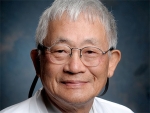Displaying items by tag: department of neurology
Tagged under
Oh honored with lifetime award from the American Association of Neuromuscular and Electrodiagnostic Medicine.
Tagged under
Haydeh Payami, Ph.D., a leading geneticist recruited to the UAB-Hudson Alpha Center for Genomic Medicine and UAB Personalized Medicine Institute, is exploring the protective power of coffee and nicotine — and the mysteries of the microbiome — in Parkinson’s disease.
Tagged under
The drug inhibits the activity of a kinase enzyme called LRRK2, and it showed no pathology in rat lungs, kidneys or livers.
Tagged under
A new study from UAB suggests that the effect of genetic variants on warfarin dose differs by race – a step towards personalized medicine.
Tagged under
UAB researchers find a chemical pathway — a glutamate transporter — that may be causing seizures and shorten survival rates for patients with brain tumors.
Tagged under
UAB is one of five centers named to host the first class of fellows in the Edmond J. Safra Fellowship in Movement Disorders.
Tagged under
UAB has established the third multidisciplinary comprehensive clinic in the world for transverse myelitis, a rare spinal cord disease.
Tagged under
UAB has received prestigious designation as a Comprehensive Stroke Center from the Joint Commission and American Heart Association.
Tagged under
Research to identify a new approach to treat Alzheimer’s disease gets new funding after a pilot grant from the Alabama Drug Discovery Alliance.
Tagged under
Tagged under
UAB neurology researcher Kristen Triebel gets substantial American Cancer Society grant to investigate the ability of patients to understand, choose and consent to treatment.
Tagged under
Tagged under

The first patient in the Southeast to get the RNS responsive neurostimulation seizure-control device implanted in the brain reports dramatic results at UAB.
UAB has launched one of the first clinics in the nation designed to provide healthy adults with an assessment of their risk for Alzheimer’s disease.
Tagged under
A ramped-up immune response may play a major role in autism disorders, according to a new study from UAB and Johns Hopkins.
Tagged under
A new UAB study reports on a potential new treatment for frontotemporal dementia, the second most common type after Alzheimer’s disease.
Tagged under
UAB researchers present warning signs that can be seen when an older adult begins to lose the ability to manage finances – which could indicate dementia.
Tagged under
Philanthropic support has enabled the UAB Department of Neurology to make huge strides in knowledge of diseases such as Parkinson’s.
Tagged under



















